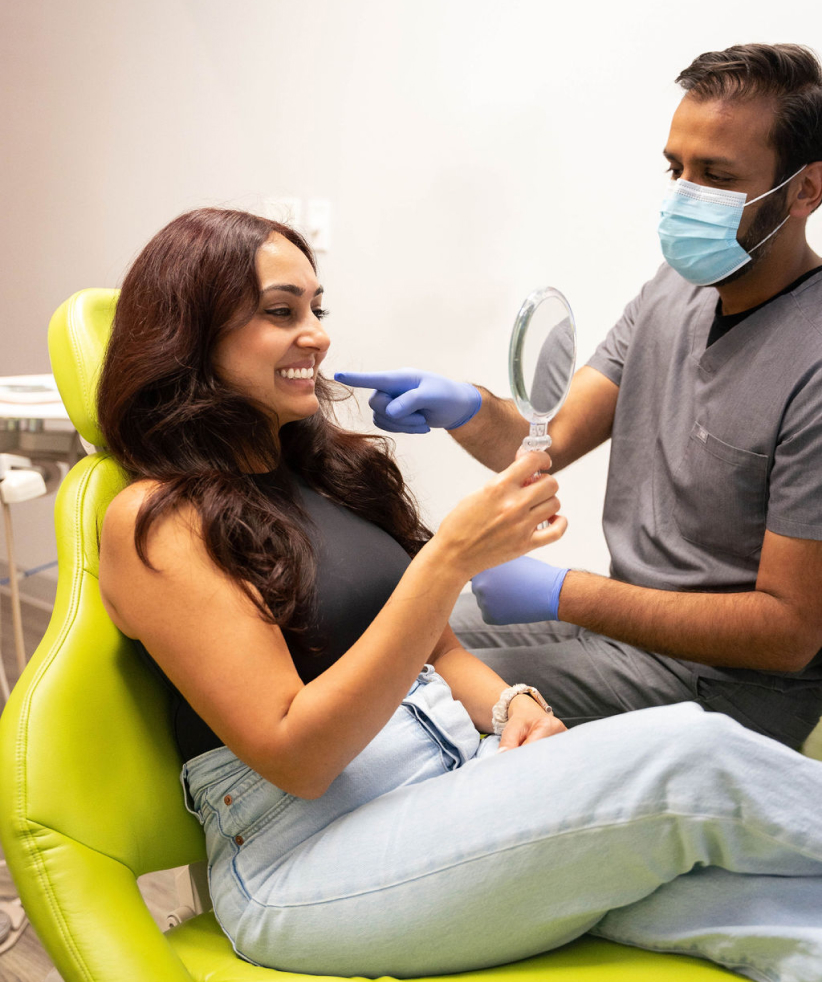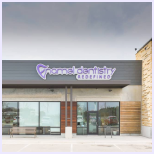
Periodontal Care
Protect your gums with regular visits to an Enamel Dentistry studio in Texas.

Keep Your Gums Happy And Healthy
Periodontal disease, also called gum disease, is one of America's most common dental health issues. According to the American Dental Association, 2 out of every 3 Americans have some form of periodontal disease and many aren't even aware. Proper periodontal care from Enamel Dentistry will help you prevent, halt, and treat gum disease. Come in and see us to keep your teeth and gums strong and healthy.
Understand The Stages Of Gum Disease And Treatment
Stages
Gingivitis and Periodontitis. Gingivitis is reversible with proper care, but Periodontitis can leave permanent damage.
Symptoms
Early symptoms are bleeding gums and bad breath. Progression leads to sensitivity, a foul taste, and recession.
Effects
Gum disease is serious. Inflammation and bacteria can get into your bloodstream and cause heart disease and strokes.
Treatment
Deep cleanings. We use diode laser technology to get faster healing and even better results with your deep cleaning.
Come In And See Us
We'll Have You Grinning From The Chin Up
We're changing the way patients experience the dentist. Our primary concern is your oral health and making sure you feel comfortable coming to see us. We know it can be scary visiting the dentist. But our philosophy of providing an easy and fun experience combined with our use of advanced AI tools, we know you'll feel different about coming to see us.
We offer:

AI Technology That Doesn't Miss A Thing
We've invested in top-of-the-line tools and the latest technology to improve efficiency and patient care. No more goopy impressions! From AI and 3D printers to iTero for digital and diagnostic impressions, we're equipped with proven equipment to ensure that every procedure is comfortable, convenient and ensures an accurate fit. Combining technology and innovations with our highly professional and knowledgeable dental team enables us to deliver the best treatment outcomes consistently.



Don't Let Finances Come Between You And A Beautiful Healthy Smile
We understand the frustration of needing dental care while feeling it may not be affordable. You shouldn't have to worry about paying for your oral health. That's why we have several options to help you easily finance your dental treatment.
Enamel Dentistry Patients Are The Best
The More You Know,
The Better Your Oral Health Will Be

.jpg)
How Do Cavities Form?
Cavities (also called tooth decay or caries) are permanently damaged areas on the surface of your teeth that eventually turn into holes. They’re one of the most common dental health issues in the world, and anyone who has teeth can get them—even very young children and infants. If cavities get large enough that they’re affecting the deeper layers of your teeth, they can cause infections, severe toothaches, and even tooth loss.
Regular brushing, flossing, and trips to the dentist are the best ways to prevent cavities from forming—but how do they form in the first place?
The Three Stages of Cavities
Cavities don’t just develop overnight; there’s a process that happens, and it begins with plaque.
Have you ever noticed a stick film coating your teeth, especially after eating sugary or starchy foods? This is dental plaque. Every time you eat, the bacteria in your mouth feed on the leftover food particles. Then, they secrete acids that turn into plaque. As plaque accumulates in your mouth, it traps acid, sugars, and bacteria up against your teeth; in turn, these start to erode away at the enamel and demineralize it.
After a while, small holes will start to develop in the enamel. This is the first stage of a cavity. Once the enamel is worn away, it makes it easy for bacteria and acid to reach the dentin, which is the next layer in your teeth. Unfortunately, dentin is much softer than enamel, and it doesn’t resist acid as well. At this stage, you may notice some sensitivity. As the cavity gets worse, the bacteria and acid continue to travel down to the next layer: the pulp.
The pulp is the inner part of your tooth that houses the nerves and blood vessels. As the bacteria and acids start to attack the pulp, it becomes inflamed and irritated. Since the pulp is trapped inside the tooth, it has nowhere to expand as it swells; this causes it to compress the tooth’s nerves—which can be very painful. If left untreated, deep cavities can lead to severe infections or tooth loss.
Factors that Can Increase the Risk of Cavities
There are several factors that can make your teeth more prone to cavities:
- Location. Cavities are more likely to affect the molars and premolars. This is because these teeth are harder to reach, and they have a lot of nooks and crannies to trap plaque.
- Certain foods and beverages cling to your teeth for longer, like dairy products, honey, cookies, hard candy, chips, and soda.
- Eating or drinking frequently gives the bacteria in your mouth a steady supply of food.
- Waiting too long to brush and floss after eating allows plaque to form and start attacking your teeth.
- Dry mouth caused by medications, medical treatments, or certain health conditions can increase the risk of cavities.
- Chronic heartburn (GERD) can cause stomach acid to wear away at your enamel
The thing to keep in mind with cavities is that they aren’t static—they grow and get bigger over time. If you don’t have any cavities yet, that’s great news! Make sure to keep up with your oral hygiene and dentist visits. If you do have cavities, it’s best to take care of them as early as possible to prevent them from getting worse. Schedule an appointment with Enamel Dentistry, and we’ll help you nip those cavities in the bud!

.jpg)
A Comprehensive Guide to Root Canals (Endodontic Therapy)
Despite the myths, endodontic therapy are key treatments that remove the pulp, save teeth and relieve pain. You will learn about root canal therapy and how to care for your tooth after, so you can confidently handle your dental health.
Endodontic Therapy Step-By-Step
Understanding Endodontic Therapy
What Does a Root Canal Look Like?
The endodontic procedure to remove the infected pulp, clean and disinfect it, and fill it to avoid further issues. Root canal pictures often show the before and after of the tooth’s interior, highlighting the clean, filled, and sealed canals.
Root Canal on front teeth - Root Canal Xray:

Root Canal Before and After:

The Lifespan of a Endodontic Therapy
How long does a endodontic therapy last? With proper dental care, including regular check-ups, cleanings, and good oral hygiene, a treated tooth can last a lifetime. A dental crown after endodontic therapy treatment adds protection and longevity.
Tooth with root canal hurts with pressure? Sometimes, it takes time for the surrounding soft tissues to fully heal after a endodontic therapy. In rare cases, some bacteria may remain in the affected tooth or the surrounding tissues, causing continued discomfort. Pressure on a cracked tooth may cause pain as well if left untreated.
If you're in pain or feeling sensitive after dental treatment, it's a good idea to see your dentist or endodontist for a check-up. They can determine the cause of the discomfort and recommend appropriate treatment to address it.
How long does a root canal last without a crown? The absence of a dental crown can greatly shorten a tooth's life. The crown is essential for protecting the weakened tooth from fractures post-treatment. Without a crown, the tooth is more likely to fail, particularly molars and premolars that handle most of the chewing.
Post-Endodontic Therapy Care
Immediate Aftercare
Can I drive after a root canal? After endodontic therapy, driving is safe as long as you feel well and have no lingering effects from sedation.
What can I eat after a root canal? What to eat after a endodontic therapy is crucial. Eat soft, easy-to-chew foods to avoid discomfort and protect the treated area.
Managing Discomfort
How to stop throbbing pain after root canal? Over-the-counter pain medication and cold compresses can alleviate pain. If you have pressure pain on root canal tooth or any other persistent discomfort, contact your dentist.
Root Canal Treatment Side Effects
- Without a crown for protection, the tooth that underwent endodontic therapy may weaken and become more susceptible to breaking. This happens because the procedure removes the tooth's pulp, which can make the tooth less strong.
- Rarely, but a few folks might get an allergic reaction to the things used in the procedure, such as the filling or anesthesia.
- Bacteria can cause another infection if it gets back into the tooth filling material. Signs of a re-infection include pain, swelling, and sensitivity.
- Root Canal Cracked Tooth: Without a crown, the tooth could crack, potentially causing infection and pain.
Common Questions and Concerns
Endodontic Therapy vs. Dental Implants
When considering root canal vs implant, remember that preserving your natural teeth is always preferable. Endodontic therapy can save the natural tooth structure, while implants replace the entire tooth.
Smoking and Oral Health
Can you smoke after a root canal? We advise against smoking because it can delay healing and raise the risk of complications.
Enhancing Your Dental Health
Preventing Root Canals
How to avoid root canal? The key lies in preventing tooth decay and gum disease through regular brushing, flossing, and dental check-ups. Addressing issues early with treatments like dental fillings can prevent the need for more invasive procedures.
Emergency Care
What about emergency root canal? When faced with severe pain or a cracked tooth root canal, immediate dental attention can prevent further damage and save your tooth.
Myths vs. Reality
The Truth About Pain
How bad does a root canal hurt 1-10? With modern techniques and anesthesia, most patients experience minimal discomfort.
Are Root Canals Bad for You?
Endodontic Therapy is a safe and effective way to treat infected teeth. The procedure removes bacteria, protecting your tooth and overall health.
Advanced Care and Alternatives
The Role of Dental Crowns
Getting a crown after root canal can help your tooth look, feel, and function normal again. A crown will ensure its strength and durability as well for the long term. The dentist will remove the temporary filling after the endodontic therapy, and complete your dental crown.
Exploring Alternatives
While there is alternative to root canal to consider, most of the time it's better to save your natural tooth.
Conclusion
Endodontic Therapy play a crucial role in dental health, addressing tooth infections and decay to save natural teeth. Knowing about root canals, caring for your tooth after, and preventing more dental issues can keep your smile healthy and free from pain. Remember, the key to a successful dental pulp therapy is early detection, proper aftercare, and regular dental visits. So, embrace your dental health journey with confidence and let root canals be a positive step towards a brighter smile.

.jpg)
Celebrate National Wine Day By Keeping Your Smile Bright!
National Wine Day falls on Saturday, May 25th this year and is a great time to celebrate with a glass of wine (or two, we won’t tell)! But wine is also one of the most common causes of tooth staining, along with tea and coffee.
How to Keep Your Smile Bright When Drinking Wine
Drinking wine won’t hurt your teeth, but it can stain them and make you feel self-conscious about your smile. Here are a few tips to keep your smile bright and avoid purple tinted teeth:
See your dentist regularly for teeth cleanings
Seeing a dentist for six-month oral exams and teeth cleanings will ensure that your teeth are free of plaque and tartar. Your teeth will be buffed and polished, which can help remove minor stains and discoloration.
Consider a white wine
White wine is free of the tannins and pigments that can stain your teeth, so think about switching to Riesling or pinot grigio
Brush before you drink wine
Since wine is acidic, it’s actually not a great idea to brush right after drinking it. Brushing immediately after drinking wine can cause premature wear to the teeth. Instead, brush your teeth before you drink. This will help remove plaque and prevent stains.
Rinse your mouth after drinking wine
Drinking a glass of water or gargling with a bit of mouthwash can help prevent wine from lingering on your teeth.
Have a salad with your wine
High-fiber foods help your mouth produce more saliva and “scrub” wine away from your teeth. Pair your wine with a salad and minimize your risk of a stained smile!
Treating Stains – Teeth Whitening And Veneers
If your teeth have become stained due to a wine habit, don’t despair! You have options. Teeth whitening from Enamel Dentistry is an ideal way to reverse and remove wine stains. We offer both in-office and take-home kits. When the powerful peroxide is applied to your teeth, it breaks up the chemical bonds that hold the stains onto your enamel and bleaches them away.
If you have very dark or severe wine stains, or your teeth are stained due to tobacco use, veneers may be a better option. Porcelain veneers can be used to cover up the front surfaces of your teeth and replace them with a bright, white, completely non-stainable surface that permanently restores your smile!
Contact Us to Learn More About Cosmetic Dentistry in Austin!
If you’re interested in cosmetic dentistry in Austin, Enamel Dentistry is where you want to be. Our dentists have years of experience treating teeth stains with whitening and veneers. Come in for a consultation today and see what treatment may be right for you. We hope to see you soon!
Should I Still Floss If My Gums Bleed?

.jpg)
Sedation Pre-Op Instructions
Pre and Post-Op Moderate Sedation Instructions
- A responsible adult, over the age of 18, must accompany the patient to the clinic and wait on site until procedure has been completed. Following sedation, a responsible adult must escort the patient home and remain with the patient for the next several hours.
- A parent or legal guardian must accompany minors (persons under the age of 18).
- No food or liquids for 8 hours before the start of the procedure. If food/liquids are consumed within this time frame, please call the office immediately
- Stay well hydrated the day before the scheduled procedure.
- Take all medications as normal with a small sip of water unless specifically directed otherwise by Dr. Dillon Patel
- >For patients diagnosed with diabetes or taking blood thinners (i.e. Plavix, Warfarin, Coumadin, Xarelto), please contact the office for instructions
- >For patients diagnosed with asthma, please bring your rescue inhaler with you
- Wear loose, comfortable, older clothing that allows access to both arms and that is not restrictive to your neck (some medications or materials may permanently stain clothing)
- Please inform your Enamel provider and have a list available of any medical conditions, medications, or any previous/upcoming surgeries before the scheduled procedure date
- If you have had any sickness involving the upper respiratory system within the past 2weeks (severe sinus conditions, severe cold, bronchitis, flu, COVID-19 etc.), please inform the clinic as your procedure may need to be rescheduled to a later date for your safety.
- Following sedation, patients should refrain from driving an automobile, drinking alcohol or engaging in any activity that requires alertness until at least the next day. This timeframe may vary from patient to patient.
For any questions, concerns, or problems prior to or following sedation, please contact: Your Enamel Doctor
Tooth troubles? Here are some common FAQ's
In most cases, the answer is no. Gum health issues like gingivitis are very rare in toddlers. If your toddler’s gums are swollen and tender, this is likely due to the natural teething process. As the teeth begin to move beneath the surface of the gums, the gums may look swollen or red, and seem inflamed. Your toddler may also be cranky or complain of pain in their mouth if they’re old enough to do so. However, this is completely normal. As their tooth erupts, their gums will stop swelling and will become less inflamed. Once the tooth has fully erupted, you will no longer notice any serious inflammation or swelling around the area.
If your gums start bleeding while you’re flossing, should you keep flossing? Absolutely! Bleeding while flossing is often a sign that you need to be flossing your gums more thoroughly or frequently—not that they should be left alone. It might sound counterintuitive, but the more you floss, the less your gums will bleed, unless the bleeding is related to physical damage to your gum tissue or a systemic issue. Many patients will stop flossing an area that bleeds, but the best thing to do is to give that area more attention!
If your gums start bleeding while you’re flossing, should you keep flossing? Absolutely! Bleeding while flossing is often a sign that you need to be flossing your gums more thoroughly or frequently—not that they should be left alone. It might sound counterintuitive, but the more you floss, the less your gums will bleed, unless the bleeding is related to physical damage to your gum tissue or a systemic issue. Many patients will stop flossing an area that bleeds, but the best thing to do is to give that area more attention!
If you have a persistent or severe toothache, this may indicate that you have an infected tooth. If this is the case, it’s critical to come in for an emergency appointment to get a root canal and restore your tooth. Enamel Dentistry offers emergency care and expert root canal therapy, and we want to make sure that our patients are informed about the signs and symptoms of infected teeth. Here are a few things to keep in mind about emergency dental care and root canal therapy in Austin:


%201.svg)
%201.svg)
%201.svg)








